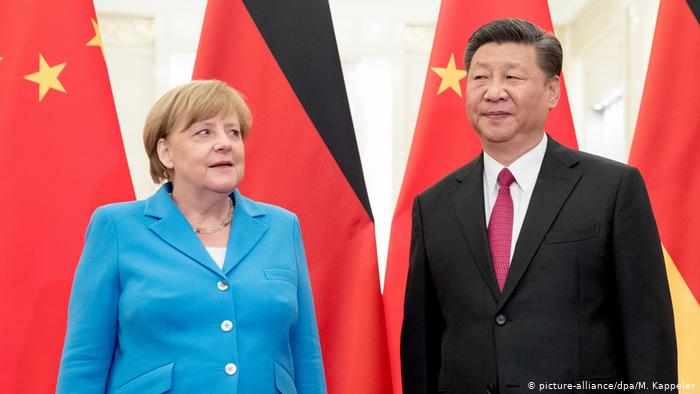“It is impossible to put our relationship with China into a single box; it is too complex,” the foreign minister of European Union, Josep Borrell, said a few weeks ago. “It does not fit into a single category. Is it an ally or a rival? A partner or a competitor? It is both,” added the European Union’s top diplomat.
These lines by EU’s foreign minister sum up the policy of 27 member nation European Union towards China. Given the fact that every member nation has a different stand on the China issue; the European Union has been unable to put up cohesive response to the dragon. The EU has member nations which are rabidly anti-China like Czech Republic and pro-Chinese ones like Germany and Italy.
Countries like Germany have put business relations with China at the forefront and cornered China on issues of human rights in Hong Kong and Xinjiang. These countries fear that China might slap tariffs on exports- like they did in the case of Australia- if the national government criticizes Beijing’s actions. China is the second-largest trading partner of the European Union, and sometimes for countries, exports are too important to speak up on human rights issues.
On the other hand, many countries like the Czech Republic and the United Kingdom, which is now out of EU, are ready to sacrifice the economic gains for human rights issues and want to look for alternatives to decouple their economies from China.
Recently, EU and China held the 30th round of negotiations over a ‘joint investment summit.’ It was to be finalized this year and the announcement would have come in the 22nd bilateral summit but was postponed due to the pandemic. The 22nd bilateral summit took place on Monday through video conferencing, in which European Commission President Ursula von der Leyen and European Council President Charles Michel – the EU’s chief executive and chairman – held video conferences with Chinese Premier Li Keqiang and President Xi Jinping.
So far, China has been successful in dealing with the EU, using a carrot and stick approach. An editorial titled, ‘How can EU avoid being a casualty in a new cold war?,’ published in Global Times, the mouthpiece of the Chinese Communist Party on 21st June, gives us a bird’s eye view of China’s strategy towards the EU.
The Carrot offered by China to the EU
The article argued that positive progress is being made in EU-China Bilateral Investment Treaty (BIT) after months of complete standstill, and if this deal is signed before the US-China trade deal, it would help EU nations to get access to the Chinese markets.
“If this momentum continues, the completion of the China-EU BIT will be significantly earlier than that of the China-US investment treaty, which would give the China-EU economic and trade players more opportunities,” wrote Global Times, which has been now recognised as a ‘foreign mission’ by the US government.
The Stick
In the same editorial, Global Times threatened the EU that the bloc could become a casualty in US-China cold war if it chose the American side. It also pointed out that the European Parliament’s decision to take the Hong Kong matter to the International Court of Justice could be a major problem in the relations between the two. It read, “If the China-EU bilateral relationship is to maintain overall stability under the current circumstances, efforts are required from both sides to overcome difficulties and find a new way forward.”
The Article’s tone
The tone of the article was very derogatory towards the European Union. It argued that the EU could become a victim of the US-China cold war as if it is a small entity that will be crushed in the fight of two big players, disregarding the fact that the EU as a bloc, forms the second-largest economy after the United States. “All these problems are both opportunities and challenges for the EU, requiring EU leaders to show political wisdom to prevent its economy from being a victim of the new Cold War,” wrote Global Times.
Such a derogatory tone for a bloc, whose combined economy is larger than that of China, shows the arrogance of the Global Times and its lack of respect for the indecisive European Union. “How the EU balances its relationship with China and the US will also pose a major test to its policymakers. A common concern shared within EU business circles right now is that Europe could become a casualty in the US-China standoff,” argued editorial by Global Times.
The European Parliament passes resolutions but the executive has no spine
European Union has been indecisive on China right from the outbreak of Coronavirus disease. The 700 plus member strong European Parliament, as well as the parliament of member countries, has been very vocal against the Chinese Communist Party, but, the Executive branch of the EU as well as national governments, have been more cautious in dealing with the dragon. The executive branch fears Chinese sanctions and tariffs of exports to China, which will hurt the companies amid these testing times when demand is already very low due to pandemic lockdown.
The European Union desperately needs Chinese investment as well as access to the Chinese market to revive its economy; therefore, the executive is avoiding confrontation with China by choosing to ignore human rights issues.
The legislature’s actions could only create media hype, but, to reflect these actions on the ground, a strong-willed executive, like that of the United Kingdom, is required. But, unfortunately, none of the European leaders have the spine to stand up to Chinese bullying.
